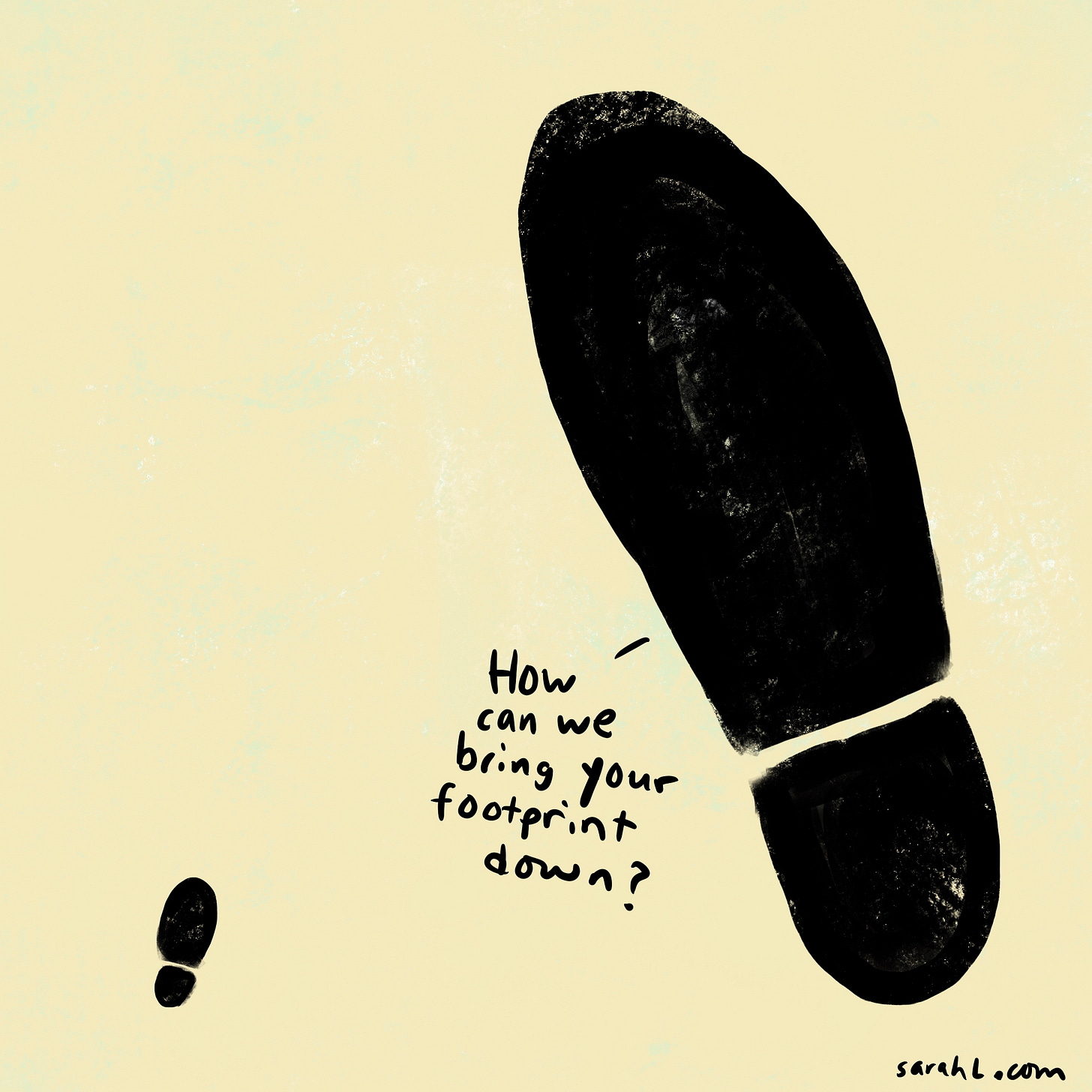They'll steal your shoes and blame you for your footprints
Or, blame-shifting
Hi! I’m Sarah. Minimum Viable Planet is my weeklyish newsletter about climateish stuff, and how to keep it together in a world gone mad. I’m always curious to know what you think.

I’ve long fretted about the personal change/system change debate, worried that the weight was unevenly born by individuals even though I strongly believe the former is a necessary catalyst for the latter. But maybe I’m J.K. Rowling-level wrong. Maybe we can skip the skipping straws and go straight to table-flipping the system. At least, that’s how I feel this week, after learning that yet another term I use quite frequently is actually BP propaganda, designed to push responsibility for the burning of the planet onto consumers, onto the already overweighted side of personal responsibility. That phrase: carbon footprint.
I’ve long known that oil was behind messaging to shift carbon emissions from their effing problem to our collective challenge, but the fact that BP literally designed the metric by which we measure our personal emissions is deepwater insidious. “It’s time to go on a low-carbon diet,” they said. All that extremely important work done by well-meaning organizations to make people consider the emissions in their daily lives is somehow covered in the slick of nefarious spin. Yes, there are other words that big polluters and their PR trolls have forced into the vernacular, but this one feels, well, personal. It’s literally my carbon footprint. How dare a shill have made it up and stuck it inside my brain?

Perhaps the bigger issue is that the phrase has burrowed deep in our soles. It’s so successful. We’re all constantly and unscientifically toting up our emissions — the thermostat too high, the flights too copious. Somehow we all feel that the crisis is our fault. We feel hot shame and deep guilt when, in full knowledge of the crisis but without much power to stop it, we partake of indulgences like travel, or overconsumption. Which is not to say that we shouldn’t reduce our own emissions and eschew waste (of course we should!). It’s just that this is the father of all guilt trips, actively foisted on us by an industry that has the power to do so much more than we, as individuals, can.
In a sense, the deck was ever stacked. Original sin. We have been told we are weak and imperfect creatures time and time again. Of course we burn fuel as we fall prey to our desires. Yes, I bought some yellow clogs I did not need.

We’re in this together is the collective Big Oil ethos, now permeated across media and minds. Except we’re not. Fracking firms fail us, and their CEOs get huge payouts. Their calumny is so great that they’ve punted the responsibility onto us and we’ve barely noticed that sly shirking. And now, as the tides turn in every way, from polls that speak to overwhelming public desire for green recovery to studies that show green fiscal stimulus is the most viable way out of this mess, the bailouts continue, largely unchecked.
What’s an average, carbon-farting human to do? Light that burning pile of foisted responsibility and toss it back over the fence. If I sound irate, it’s because I am. Just kidding, I meditate now.
THIS WEEK
Have you internalized responsibility for it all? What spin have you absorbed, and what do you do to push back against it? Please, tell me about it!
PEOPLE DANCING
Hope you are safe and healthy. Have a wonderful week,
Sarah
PS If you like this email it, share it if you are so inclined. Or heart it. And if you hate it, tell me how to better it. Thank you thank you!




This reminds me of the infant formula feeding propaganda - "breast is best"? invented by formula manufacturers - not as it is widely attributed to, the breastfeeding advocates. It's insidious and nasty. Question everything.
Thanks for this eye opener. The Mashable article is a good reminder of how insidiously and ubiquitously the fossil fuel industry distorts useful concepts. However, it's a bit misleading. BP may have originated the "carbon footprint" propaganda, but they can hardly be said to have invented the concept. It goes back to the "ecological footprint," which was conceived much more broadly than as a tool for individuals. As I recall from my first encounter with it in the 1990s, the inventors described it mainly in terms of cities, showing that a city's impacts are much larger than the land on which it sits or even the downwind/downstream areas it pollutes. Mathis Wackernagel and the Global Footprint Network still emphasize nations and communities in their ongoing work to foster this kind of systems thinking: https://www.footprintnetwork.org/our-work/ecological-footprint/